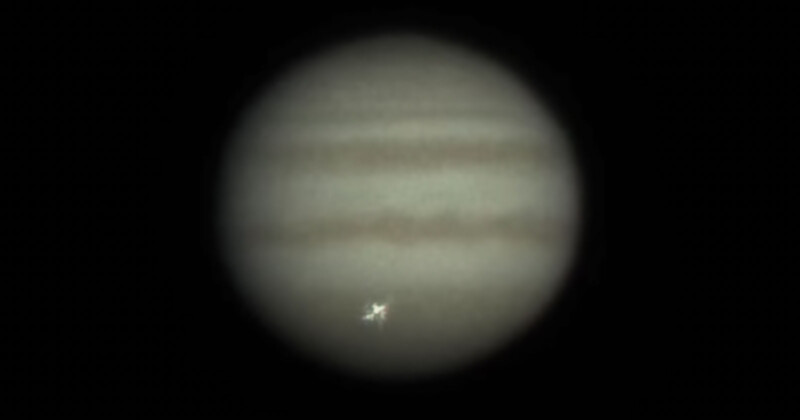Amateur Astrophotographer Captures Rare Jupiter Explosion
An amateur astrophotographer captured a rare fireball hitting Jupiter marking one of the brightest flashes ever recorded on the planet.
Tadao Ohsugi captured the enormous explosion on the gas giant and it is thought to be an asteroid or a comet striking Jupiter’s atmosphere.
“While photographing with an astronomical telescope in my home observation room, I saw a flash of light on Jupiter’s surface,” writes Ohsugi on his YouTube channel. “It’s probably a light that seems to be a collision with a meteorite or something like that. I was lucky.”
Dr. Ko Arimatsu, an astronomer at Kyoto University in Japan, tells The New York Times that even advanced telescopes can’t directly observe the space rocks that make these explosions.
“Jupiter’s gravity lures in these objects, which eventually slam into the planet, making it a unique and invaluable tool for studying them directly,” says Dr. Arimatsu.

These rare flashes are an important way of understanding the history of the solar system.
“They offer a glimpse of the violent processes that were happening in the early days of our solar system,” says Leigh Fletcher, a planetary scientist at the University of Leicester in England. It’s like “seeing planetary evolution in action.”
Ohsugi was recording Jupiter on a high video frame rate which allows scientists to freeze the frames which contain “a treasure trove of data.”
However, the impact recorded by Ohsugi wasn’t strong enough to leave behind a visible debris field like the one that hit Jupiter in 1994.
“If I was a betting man, I would say that all of our giant planets are being bombarded by asteroids and comets,” adds Dr. Fletcher.
However, little is known about the comets that are thought to be bombarding not just Jupiter, but Saturn, Uranus, and Neptune as well.
It means that space enthusiasts like Ohsugi are the intrepid researchers who will keep capturing the random flashes and carrying on this useful science.
“You can’t have hours and hours, night after night, on big professional telescopes,” says Dr. Fletcher. “You have to have dedicated backyard astronomers across the globe to be able to do it.”